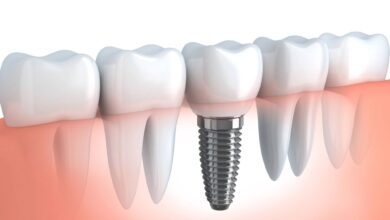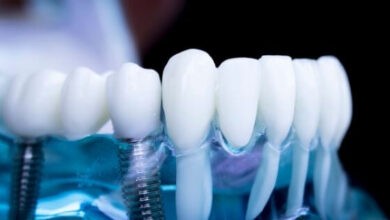Can Wisdom Teeth Grow Back?

There is an appropriate growth pattern of human teeth. Teeth erupt twice in human life. One is the primary teeth that erupt in childhood. The other is the secondary teeth usually start erupting at six to seven years of age. In addition, secondary teeth follow the primary teeth except for some teeth. This topic reviews the main question can wisdom teeth grow back after removal.
Wisdom teeth are part of secondary teeth. They have no predecessors in primary teeth. Wisdom teeth usually erupt after the age of 17-21 years. Nowadays, there are several complications of wisdom teeth. Most dentists recommend removing wisdom teeth to maintain oral hygiene. But once you remove wisdom teeth, your wisdom teeth cannot grow back.
What are wisdom teeth?
Wisdom teeth are the set of four 3rd molars that erupt in the right and left sides of both jaws. Wisdom teeth usually erupt in the late teenage period. The major indication for wisdom tooth eruption is pain in the back mouth. In addition, it can also cause difficulty in opening the mouth.
When to worry about wisdom teeth?
There is no need to worry about wisdom teeth unless you suffer from severe pain. Wisdom teeth can erupt without causing any pain. Wisdom teeth removal is common nowadays because of painful eruption. Once the wisdom teeth are removed, you need not worry about growing back. But, there are several conditions for which we need to visit the dentist as soon as possible.
- Inflammation at the back of the mouth due to food entrapment
- Wisdom teeth cause crowding of the teeth. Therefore, it prevents oral hygiene.
- Partially erupted wisdom teeth in the mouth can allow bacteria to grow and develop an infection.
- Wisdom teeth having not enough room to erupt can damage nearby teeth. Moreover, it can also cause severe pain in the mouth.
Why do we need to extract wisdom teeth?
Most of the time, dentists recommend removing wisdom teeth. There are several causes for the removal of wisdom teeth. Some of the main causes are as follows:
- There is an aberrant position of wisdom teeth in the mouth. It can affect the other teeth in the mouth or unable to erupt in the oral cavity.
- It may cause damage to the adjacent teeth by putting pressure against the teeth.
- There may be cyst formation around the impacted teeth. These cysts can damage the jaws.
- There may be intense pain associated with the impacted wisdom teeth.
- There may be tooth decay because of increased bacterial growth in the pockets between teeth.
- One of the most common causes is wisdom teeth impaction. Impacted wisdom teeth are unable to erupt. Therefore, it requires the removal of the wisdom teeth.
Can wisdom teeth grow back?
This point is a common question in dental practice. Once you have extracted the wisdom teeth, it is difficult for wisdom teeth to grow back. There is a single tooth bud for every tooth in the lifetime. This tooth bud develops into the complete tooth structure. But after removal, there is no chance for your wisdom teeth to grow back.
Usually, there are four wisdom teeth. They erupt in the jaws sequentially. There may be a chance of more than four wisdom teeth in a person. Having more than four wisdom teeth is known as supernumerary or extra teeth. These extra teeth are an anomaly of the teeth.
How can I know about having more than four wisdom teeth?
Most people have four wisdom teeth. But, there are some people who have more than four wisdom teeth. In contrast, some people don’t even have a single wisdom tooth due to a lucky mutation. You are conscious about your wisdom teeth. Visit your dentist, 1and he will clear all your doubts with some examination.
Dentists usually ask for a dental X-ray to identify extra teeth in the mouth. A dental X-ray can provide all information about the erupted and unerupted teeth in the mouth. In addition, it can also describe other anomalies of the teeth. Moreover, dental X-rays are the best tool for confirming any misleading condition.
What are the consequences if I have more than four wisdom teeth?
Your dentist will provide you with all important details related to extra wisdom teeth. In addition, he will also inform you about the clinical aspects of extra teeth. He will suggest some medical procedures according to your oral condition. There are some important treatment plans for extra wisdom teeth.
- These extra teeth are the marker of genetic conditions. Therefore, some medical tests are necessary to discard any serious medical condition.
- Your dentist may alert you about various oral conditions and orthodontic issues. These extra teeth may also cause severe pain.
- There may also be a need for surgery to remove these extra teeth. It will help to prevent you from serious oral damage.
What is the surgical procedure to remove wisdom teeth?
Removal of wisdom teeth usually takes about 45 minutes or more. Your dentist will also properly investigate your health condition and plan treatment according to the condition.
- Medical and dental history before starting any dental treatment
- Local anesthesia according to your health status. Your dentist may also recommend general anesthesia for all four wisdom teeth removal.
- The surgical procedure involves incisions at your gum for visibility. Moreover, there may also be a need for bone removal. Wisdom tooth removal follows stitches according to the condition.
- Stitches dissolve after a few days, and the wound heals.

What to do after wisdom teeth surgery?
There may be swelling and pain after the wisdom teeth removal. In addition, you will also be unable to open your mouth properly due to pain. There are some important instructions to follow after surgery. These will help you to resolve swelling and pain.
- Apply an ice pack to the affected side of your face to reduce swelling and inflammation around the surgical site.
- Do jaw exercises by slightly opening and closing your mouth.
- Avoid brushing for a few days of surgery. Brushing can disturb blood clot formation.
- Avoid drinking through a straw and increase intake of liquid diet to prevent dehydration.
- Rinse your mouth gently with saltwater.
Conclusion
If you have done an extraction of your wisdom teeth, there is no chance of wisdom teeth growing back. You may be one of the few people who have extra wisdom teeth. These extra teeth can erupt anywhere in the mouth. These extra teeth are known as supernumerary teeth.
If you feel any extra teeth in your mouth, visit your dentist. Dentists can identify extra teeth in the mouth with the help of X-rays. Moreover, dental X-rays can provide extra details about the extra teeth.
Frequently asked questions(FAQs)
What if my lesions didn’t heal after wisdom teeth removal?
If your wound is not healing after a couple of days, you must visit your dentist. There may be some sharp bony edges that can prevent wound healing. Moreover, there can be any other condition that hinders the healing process.
Does everyone have wisdom teeth?
Most people don’t have wisdom teeth at all. Some have all four wisdom teeth. There are also a few people who have more than four wisdom teeth. The common reason behind this is genetic mutations in a family.




